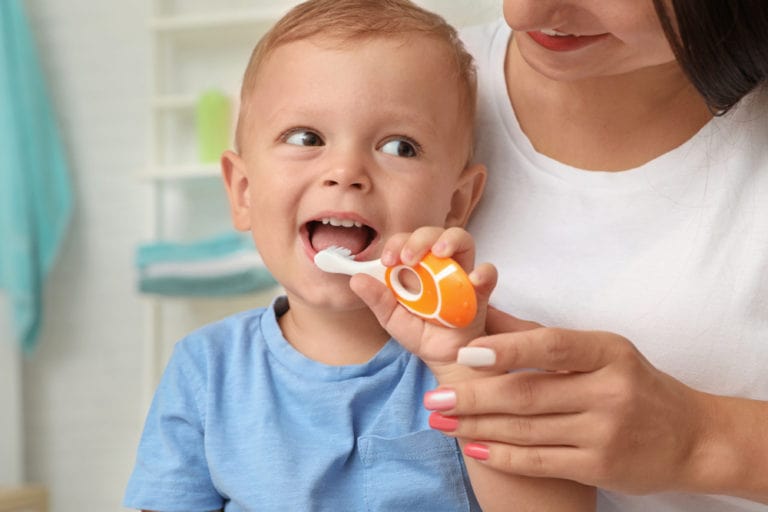Cavities In Baby Teeth
Did you know that many parents take infants and toddlers to the doctor up to 12 times from birth to age three?
At our dentist office, we might visit with a child just once time in that same time period! This means that the responsibility for the detection of dental problems, such as cavities in baby teeth, often falls on a primary health care provider.
The problem is that physicians simply aren’t trained the way a dentist is to evaluate, diagnose and (especially) treat dental issues—including how to treat cavities in baby teeth. At Chester County Family Dentistry, we are dedicated to providing the best dental care for children. We employ state-of-the-art technology, practicing the latest approaches in dentistry. Keeping your little one comfortable and healthy is our number one priority!
Ten Things About Cavities In Baby Teeth That Every Parent Needs to Know
Are cavities in baby teeth common? Sadly, research has demonstrated that cavities are alive and well in America, especially in young children. The good news, however, is that there are several things parents and caregivers can do to help reduce their child’s probability of developing a cavity.
The American Academy of Pediatric Dentistry (AAPD) recommends bringing your child to the dentist by their first birthday or when the first tooth emerges. This is a preventative strategy that is absolutely essential in early childhood. The sooner a cavity or dental problem is detected, the better the treatment experience and outcome!
Not only will bringing your child to the dentist as a baby help in protecting against cavities; it also allows your child to become familiar with the experience of dental visits. Dr. Dunn and I can provide personalized guidance on oral health care and prevention strategies. It all starts with making sure you’re aware of the dangers of cavities in baby teeth!
Take a look at ten facts every parent should know when it comes to cavities in baby teeth:
- According to the The National Institute of Craniofacial Research, 42% of children between the ages of two and eleven have cavities in their baby teeth.
- Dentist-applied fluoride varnish can prevent approximately 33% of cavities from ever occurring in baby teeth.
- A mother helps her toddler son in a blue shirt to brush his teeth with an orange toothbrush.Dental sealants applied to the chewing surfaces on the back teeth can prevent upwards of 80% of cavities from developing.
- There is a link between poor nutrition and cavities. A balanced diet consisting of fresh vegetables, fruit, whole grains, and lean protein builds healthy teeth and gums while staving off cavities.
- Snacking can lead to cavities, which is why we recommend limiting snacks throughout the day and staying away from sugary, processed foods as much as possible. These types of snacks produce plaque—a sticky bacteria that covers the teeth and leads to cavities.
- Drinking water can help rinse away icky cavity-producing bacteria and is healthier than juice and soda, which often contain large amounts of sugar.
- Many parents ask, why fill cavities in baby teeth? The idea that baby teeth are “disposable” is a myth. It is not just important to encourage positive oral hygiene habits; premature tooth loss due to decay can have a negative impact on your child’s future permanent teeth.
- Brushing the teeth and gums, even as babies, helps children establish lasting positive, healthy routines and prepares them for visits with the dentist.
- Flossing will help reduce the likelihood of cavity development. Teaching children to floss or use an interdental cleaner between teeth is necessary to remove hard-to-reach plaque that causes cavities.
- You are your child’s best advocate for cavity prevention! Dr. Dunn and I are here to guide you in cavity prevention strategies and provide dental cleanings, but you’re with your child for all the time in between check-ups! Your influence can help set your child up for optimal oral health for years to come!
An additional tip to remember for new parents is to make sure not to send your baby to bed with a bottle. Bottle tooth decay is caused by bacteria that settle on your child’s teeth and gums. Bacteria can also be spread by mom’s or dad’s saliva, so it’s best to avoid sharing spoons and utensils. And, for babies who take a pacifier, it’s important to make sure to keep the soothing devices clean and safely sterilized between each use.
Ask the ExpertsMore Ways to Encourage Best Oral Health Outcomes for Your Child
At CCFD, we love educating families and sharing resources on how to achieve the best oral health outcomes. And, we offer a number of special services to make sure your child feels comfortable and relaxed at our office. As part of our comprehensive “comfort offerings,” we provide patients with:
- Nitrous Oxide
- Patient Education Multimedia
- Satellite radio
- Streaming Music Services
- Wireless Internet Access
If a cavity does develop and needs to be treated, we provide mercury-free dentistry at CCFD. Our composite filling process is safe, and the result is a protective material that matches the natural color of your child’s natural tooth.
To give your child the jumpstart needed for a lifetime of good oral health, it’s important to establish a dental home. In making CCFD your family’s dental home, you’ll be securing a safe, comfortable, and friendly place your child can grow in. Call us now and one of our team members will help you schedule an appointment.Book My Appointment
